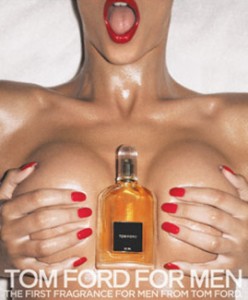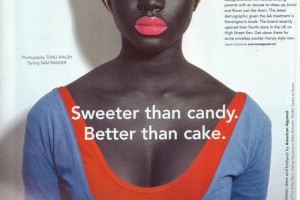In this viral day and age, people are moving at such a quick speed, marketers must find a way to attract consumers’ attention, even if it’s just for a minute. Every day we see examples of a half nude individual, selling not only a product but essentially their body:
However, what about the other types of controversial advertising that we are constantly faced with? Take for instance, the following ad, produced by American Apparel, a company notorious for their sexually and (sometimes) racial advertisements:
The advertisement is an ignorant portrayal of an African American woman, suggesting that she is no more than her full-lips and “sweeter than candy” demeanor.
A company that is no stranger to controversial marketing is EA Sports. Recently, they launched an ad campaign in which they subjected mothers to the horrifying violence of their video game “Dead Space 2”. EA then used these women’s reactions in commercials to promote the company.

Additionally, back in 2009, EA paid fake picketers to protest against “Dante’s Inferno”, in order to market the video game. EA, along with hundreds of other companies, has recognized how successful any type of publicity can be.
During the 2011 Superbowl, Groupon aired their first ever commercial which suffered a substantial amount of backlash for being offensive:

The most controversial marketing ongoing right now is Charlie Sheen’s manic rampage. Although he has because an infamous Hollywood face, I must question whether this will benefit him or hinder him? As they say, there’s no such thing as bad publicity.
Although the topic of unethical or controversial advertising has not been discussed in our marketing class, I believe it is a very important discussion to have. I believe there is a fine line between producing a risky commercial (Groupon) or simply being clearly offensive (American Apparel) and it’s a marketer’s responsibility to recognize when they have crossed the line. Don’t get me wrong, I am all for an attention-grabbing, risqué advertisement. Additionally, I believe that advertisers must take risks in order to spark conversation around their product, but it shouldn’t be at the expense of a particular ethnic group, gender, or sexual orientation.



{ 0 comments… add one now }